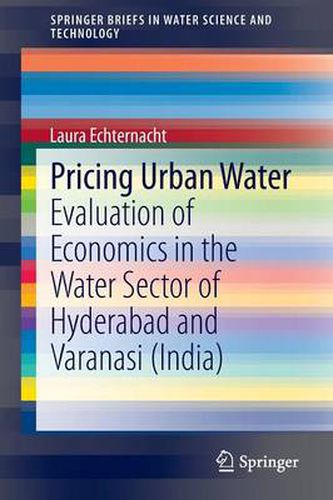Readings Newsletter
Become a Readings Member to make your shopping experience even easier.
Sign in or sign up for free!
You’re not far away from qualifying for FREE standard shipping within Australia
You’ve qualified for FREE standard shipping within Australia
The cart is loading…






This title is printed to order. This book may have been self-published. If so, we cannot guarantee the quality of the content. In the main most books will have gone through the editing process however some may not. We therefore suggest that you be aware of this before ordering this book. If in doubt check either the author or publisher’s details as we are unable to accept any returns unless they are faulty. Please contact us if you have any questions.
High population growth, informal settlements, and organizational and financial mismanagement represent major challenges for the water supply in many cities in developing countries. This book contributes to solving those problems by identifying systematic shortcomings and proposing solutions to improve the financial conditions in two representative cities: Hyderabad and Varanasi. Serious improvements are necessary for the further development of the water supply and sanitation networks in these areas.
Pricing Urban Water offers a theoretical introduction to economics of the water sector, including the theory of water pricing and tariff systems, combined with detailed analyses of the water supply and sanitation infrastructure as well as of the municipal suppliers of Hyderabad and Varanasi. Introducing a method for estimating future water production costs in both cities serves as the basis for a tariff revision, which is put forward as one solution to improve the poor financial conditions both suppliers are in. Besides the revision of the tariff systems, some considerations on how to supply and charge urban poor and on the inclusion of private borewells in the tariffs are part of the discussion. Changes in both the organizational structure of the service providers and in the current delivery and use of the services are presented as further solutions to the problems in this sector.
$9.00 standard shipping within Australia
FREE standard shipping within Australia for orders over $100.00
Express & International shipping calculated at checkout
This title is printed to order. This book may have been self-published. If so, we cannot guarantee the quality of the content. In the main most books will have gone through the editing process however some may not. We therefore suggest that you be aware of this before ordering this book. If in doubt check either the author or publisher’s details as we are unable to accept any returns unless they are faulty. Please contact us if you have any questions.
High population growth, informal settlements, and organizational and financial mismanagement represent major challenges for the water supply in many cities in developing countries. This book contributes to solving those problems by identifying systematic shortcomings and proposing solutions to improve the financial conditions in two representative cities: Hyderabad and Varanasi. Serious improvements are necessary for the further development of the water supply and sanitation networks in these areas.
Pricing Urban Water offers a theoretical introduction to economics of the water sector, including the theory of water pricing and tariff systems, combined with detailed analyses of the water supply and sanitation infrastructure as well as of the municipal suppliers of Hyderabad and Varanasi. Introducing a method for estimating future water production costs in both cities serves as the basis for a tariff revision, which is put forward as one solution to improve the poor financial conditions both suppliers are in. Besides the revision of the tariff systems, some considerations on how to supply and charge urban poor and on the inclusion of private borewells in the tariffs are part of the discussion. Changes in both the organizational structure of the service providers and in the current delivery and use of the services are presented as further solutions to the problems in this sector.